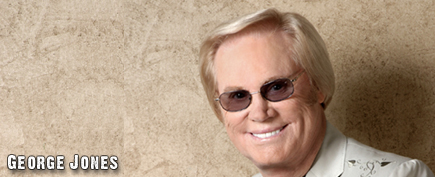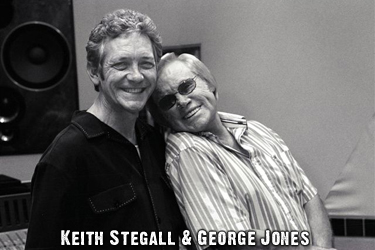The songs were chosen by Jones and Stegall along with Evelyn Shriver and Susan Nadler, with whom Jones formed Bandit Records in 2001. Hits I Missed... and One I Didn't is Jones' fourth release on Bandit.
Jones, 74, suspects that several of these songs were written with him in mind - in particular Hank Williams Jr.'s "The Blues Man." Although the song has elements of both Williams and his famous father, "The Blues Man" contains pointed references to the former "No-Show Jones"' notorious past: "He got cuffed on dirt roads / He got sued for no-shows." Jones had the idea to personalize the song further by singing it in the first person.
Jones decided to make "The Blues Man" a duet, and invited Dolly Parton to perform with him on the track and video. "That


January 10, 2006
© Dennis Carney

© courtesy of George Jones
A Can't-Miss Proposition for Country Music Hall of Fame Member George Jones
By Chris Neal
© 2005 CMA Close Up News Service / Country Music Association, Inc.
It's always painful - or at least annoying - for an artist to pass up a song, only to see it become a big hit for someone else. On his new album, Hits I Missed ... and One I Didn't, George Jones shares with fans 11 songs he wishes he'd recorded when he had the chance - and a new version of a classic of his own that he nearly didn't record, "He Stopped Loving Her Today."
Seven-time CMA Awards winner Jones and producer Keith Stegall began work on Hits I Missed ... and One I Didn't late in 2004, then finished up over the summer of 2005. Stegall, who has worked with Jones on and off since 1999's critically hailed The Cold Hard Truth, said the singer's working method is "pretty simple. I usually get him to sing each song from top to bottom five or six times. I try to let him give me performances instead of bits and pieces, and most of the time we catch the magic in two or three passes."
Typically, the only people in the studio during vocal recording are Stegall, Jones, an engineer and Jones' wife of 22 years, Nancy. "She sits on the couch, and we try to get him to have as much fun as he can," Stegall said. "It's pretty laid-back and low-maintenance. It's George Jones doing his thing, and I try to let him do that without getting in his way."
was another amazing experience for me," Stegall said. "To get to work with another legend and see how professional - and how good - she really is, was quite an exciting thing."
Jones says his singing has improved since he stopped smoking several years ago, and he's now hitting high notes he hasn't reached for decades. Jones has now been singing for more than half a century - so it's fitting that the album opens with Willie Nelson's "Funny How Time Slips Away."
"What can I say about this classic other than I can't understand why I hadn't recorded it earlier?" pondered Jones in his liner notes for the album. After the recording, Jones and Stegall invited Nelson to the studio for his approval. "He loved it," Stegall reported.
Bluegrass star Rhonda Vincent contributed vocals to a song by another Country legend, Merle Haggard's "Today I Started Loving You Again." She was understandably thrilled to hear her own voice alongside Jones'.
"He is just awesome," Vincent raved. "George is so smooth, and he knows how to make every interpretation of the song absolutely perfect."
Stegall believes that time has only added authority to Jones' voice. "There's a lot of pain in that voice, a lot of melancholy, a lot of experience," he said. "You get the culmination of all those years of him doing what he's done coming out at that moment. It's very primal, it's very haunting, it's very moving. There's not that many singers that have that kind of gift. He just opens his mouth and it rolls out."
Jones himself believes he now sings his most revered hit, the 1980 CMA Single of the Year "He Stopped Loving Her Today," better than he did on the original. Nonetheless, Jones says he has avoided re-recording the song for the last quarter-century out of respect for its producer, Billy Sherrill. He sought and received permission from the now-retired Sherrill to take a crack at re-recording the song.
Stegall, however, took a bit more convincing.
"That was something I backed up against completely," he admitted. "I was scared to death that the critics were going to cream me over it. I told him, 'Man, I don't know. This is like going into sacred ground.' Basically, I tried to keep it true to Billy Sherrill's original, because that will always be the quintessential record. I just hope that people will be kind, and not just think that I was pompous enough to think I could ever match that record."
Jones recorded a lot of older songs for Hits I Missed ... and One I Didn't, but also tried his hand at more recent fare including Alan Jackson's "Here In the Real World" and Randy Travis' "On the Other Hand."
The selection of material on the album is stellar with covers of songs famously performed by Mark Chesnutt ("Too Cold At Home"); Vern Gosdin ("If You're Gonna Do Me Wrong"); the Mel Tillis penned and Bobby Bare signature hit "Detroit City;" and Johnny Rodriguez's 1972 debut hit ("Pass Me By").
"Like anything else that George records, he made it his own," Travis said. "He's just one of those guys. If I were gonna call out two of the most unique vocalists I've ever heard or ever will hear, it'd be George Jones and Ray Charles."
A song associated with Charles, the Harlan Howard-penned "Busted," also appears on Hits I Missed ... and One I Didn't. Stegall says it was Jones' idea to give the track a Cajun feel. "I thought that was kinda neat, because we did it a little different than Ray Charles did it," Stegall said. "They were all a blast to redo. It was great to hear him sing them the way he sings 'em."
The Country Music Hall of Fame® and Museum in Nashville salutes George Jones at "The Grand Tour: George Jones Country" exhibit which was unveiled in December and runs through May 2006. The exhibit examines Jones' 50-year career, from his early Starday recordings, through the scores of Country classics recorded solo and with Tammy Wynette.
On the Web: www.georgejones.com